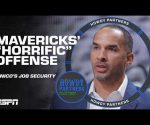Björn Borg recounts his heavy drug use, prostate cancer and recovery in memoir 'Heartbeats'

Impossibly talented and undeniably handsome, Björn Borg transcended his station as one of the greatest tennis players on the planet in the 1970s, morphing into an upper-crust teen idol, a symbol of silent stoicism and the polar opposite of his chief rival, the fiery John McEnroe.
Nicknamed the "Ice Borg," the blond Swede became a global superstar, winning 11 Grand Slam titles — five consecutive Wimbledons and six French Opens — and grew to hate every minute of it.
Borg abruptly retired in 1981 at age 26 and all but disappeared for more than 40 years. That's not to say his life after tennis hasn't been eventful, and he unpacks it all in an autobiography, "Heartbeats," that will be released Tuesday in the U.S.
“All I could think was how I didn’t belong in this world anymore and how miserable my life had become,” Borg writes about his decision to walk away from the sport that he had conquered but that in turn had consumed him.
“The thoughts grew heavier by the second, and suddenly, everything felt ice cold and crushing. Now I knew there was absolutely no joy left in it for me.”
Read more:How do you buy tickets for the L.A. 2028 Olympics? LA28 outlines its ticket schedule
His life has been one of privilege but also was devoid of meaning for years, he said in a video interview with the Guardian. In the memoir, which was released Thursday in the United Kingdom, Borg, 69, dispassionately recounts the heavy cocaine and alcohol abuse that began shortly after he walked away from tennis, his recent bout with prostate cancer and finding inner peace and a measure of happiness with his third wife, Patricia Östfeld, two sons and two grandsons.
"I was lost in this world,” Borg said of his 1980s drug use. “I didn’t have any help. I didn’t have a team or agents to push me in the right way. I did everything by myself, I didn’t really have any help during that time and it’s very tough to fix yourself.”
He became a regular at famed New York City nightclub Studio 54, partying with rock stars Mick Jagger, Elton John, Rod Stewart and Sting. Later, he relocated in Los Angeles and spent time at the Playboy mansion. “The place was full of temptations of every kind, and it was hard to say no,” Borg writes.
Although he was always quiet and reserved, Borg cultivated many friendships during his playing career, including with fellow tennis superstars McEnroe, Jimmy Connors, Ilie Năstase and Vitas Gerulaitis. Yet he cut ties with them when he quit tennis and expressed regret during his interview.
“I didn’t keep in touch with the players,” he said. “When I left tennis, I left all my friends. I left everything. And that was a huge mistake. I went into a different crowd, people who weren’t interested in sport. That’s why I started with drugs and pills and drinking.”
Read more:Tennis star Taylor Townsend apologizes for critique of unfamiliar foods offered in China
Borg admits to several relapses during the 1990s when he also made an abbreviated tennis comeback. He met Östfeld in 1999, and writes that he has remained drug-free ever since. He also slowly reintroduced himself into polite society.
He had avoided going to Wimbledon for years, embarrassed about what he had become, but in 2000 he returned for a parade at the Millennium Championships. Former champions were introduced and Borg received the loudest ovation.
"[Wimbledon] invited me all the time, but I didn’t feel comfortable," he said. "The way I’d been living, what had happened, all these things. But then one day soon after I met Patricia, I said, ‘Now I feel ready to go back to my favorite tournament.’ And I’ve been back almost every year since then."
Near the end of the autobiography, Borg also delves into his battle with advanced prostate cancer, which required an operation in 2014. He is in remission but says doctors told him "sleeping cancer cells" remain in his body.
“A few days after the operation, the surgeon said, ‘This was really, really bad. But you’re OK,’” Borg said. “I have these sleeping cancer cells. They could be sleeping for many years, but they could come out and give me problems. I just have to wait and see. I have to go back for six-monthly checks. Right now I feel good, no problem.”
Borg says he is comfortable, having earned $ 36 million in career prize money and more than double that in endorsements and investments. He enjoys simple pleasures and expresses no regrets for quitting professional tennis so young. He does, however, still love the sport.
“I want to spend a lot of time with the family," Borg said. "Stay involved with tennis, to travel, to watch tennis, to spend time with my tennis friends, with the people who love tennis, but to be with the family, with the kids, with the grandchildren, that’s very important to me.”
This story originally appeared in Los Angeles Times.










